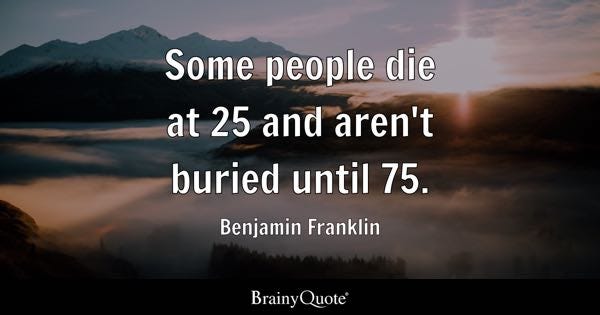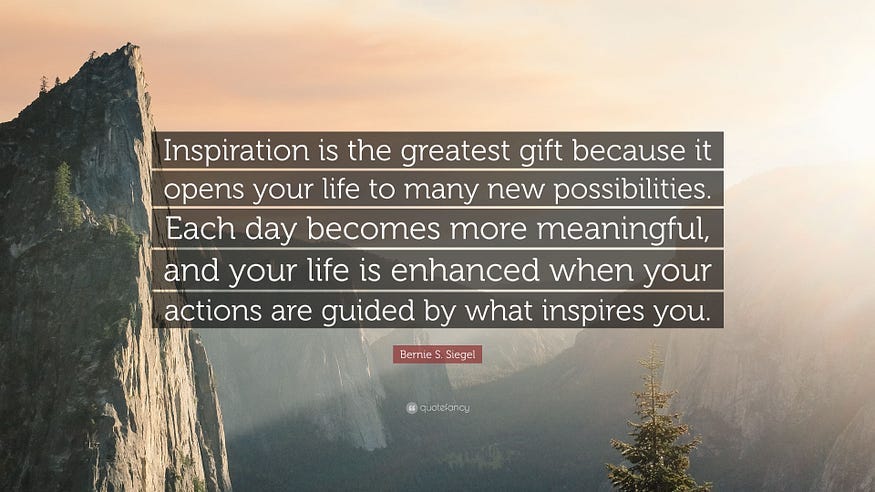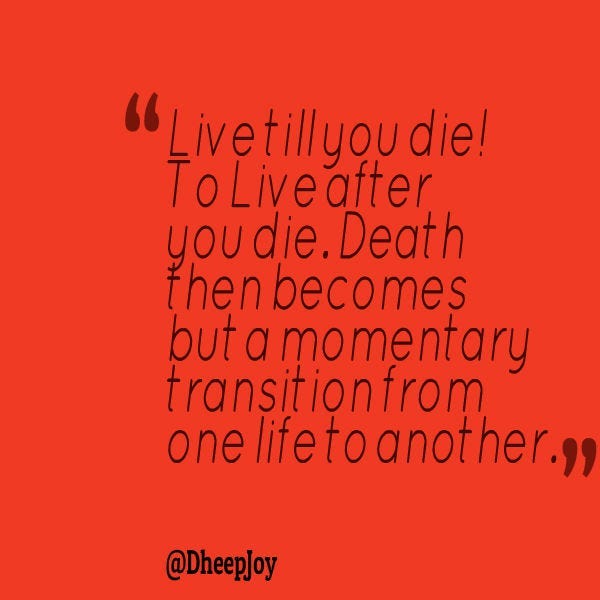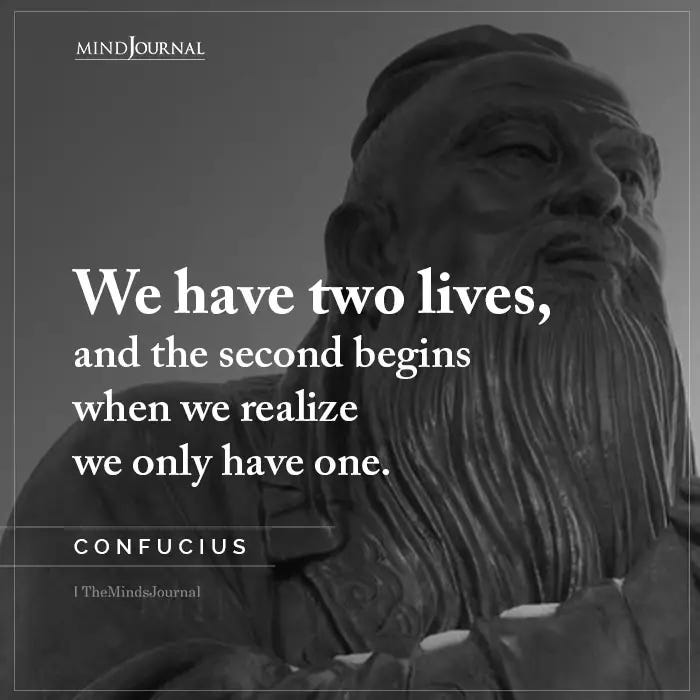Do We Really Die When We Are Dead, and Live When We are Alive?
Reflections on the meanings of life and death, on what it means to live and be fully alive; in life, in death and after death
Hello Dear,
It has been a few days since the previous post…the reason for the hiatus is a dent in my enthusiasm: one, a general reduction in my enthusiasm as a whole, and two, a specific decrease in my zeal for writing the posts in this One Doubt Please #NotJust Newsletter. If you would ask me why, let me just say for now, that the two reasons are in a sense related [How could they not be, right? I am one person after all; or am I not? Are we all split characters and personalities? And further, if we are so split, does that mean that we are not integrated, that we hence do not have “integrity”?]. Further, the reason for the drop in my energy level for writing these posts can be encapsulated in the phrase #NotJust - which I have been using to describe this #NotJust Newsletter. 😊
That said, it so happened that one subscriber of this newsletter, who also happens to be perhaps the most enthusiastic reader of “One Doubt Please” so far (besides being very appreciative, she had also told me that she never misses any post), told me yesterday that she “is waiting for one doubt please”. Well, I guess that is one - but not the only - reason why I think I am back - for now.
Well, there is a third reason for the gap in my posts. Quite simply, I was into some writing, which is however incomplete, and yet to be published. Well, this reminds me however, of another of my philosophies and beliefs:
All writing is incomplete.
I think there is an oft-overlooked beauty in observing, recognizing, appreciating and even celebrating the incompleteness, even as we seek to bring completeness. Here is a question:
Are our lives ever complete?
I would like to believe that our dearly departed ones continue to live on, even after - and wow, especially after - their bodies bid adieu to their earthly sojourn. How can we say, #NotJust even after, but especially after?
Because we tend to realize the value of the people in our lives, more when they are gone from our midst, than when they are present right in front of us. And due to this dynamic, our dear ones get to live perhaps even in ever-greater vibrancy and vitality, after they leave us - just that this life, this living, happens more due to they living in our hearts and through our fond memories of them.
Well, I regard myself as someone who has a rather poor capability in comforting people when they are in distress (though yes, quite a few people have told me that I have helped them feel better and lighter); either way, let me share that it is the above philosophy which forms the basis of one message I often share with people who have just lost someone dear. Besides expressing condolences, I wish them that let their dear one live on, in their hearts, and through the memories of the people whose lives he or she touched.
Yes, this could bring us to the following conclusion:
The goal of life is to live such a life which never comes to an end.
Is it? Is that too self-important and vain an aspiration? I mean, the desire to be remembered after we leave the earth? Yes, this desire is indeed vain, I believe. What we are talking about rather is that:
Let our goal be to let our love and life live on through the people in our lives, so that they are able to continue to have our presence and love in their lives, even if and especially if we are not with them in body.
In fact, this brings us to another question. When do we really live? Is our life mostly here on earth, i.e., while we are here in body, or is it mostly after our bodies leave the earth, so to say, or become one with the earth, i.e., after what we conventionally call as our “death”? I mean, if we are able to live on in the hearts, minds, spirits and memories of our dear and near ones and others whose lives we may have touched in some way (interestingly, this influence can be in both negative and positive ways), then, could it be that our life is mostly after our earthly sojourn?
Which brings us to another question:
Could it be that a great life is one in which more of one’s life is lived after our bodies leave the earth, as opposed to an unremarkable life in which more or most of one’s life is lived while we are here on earth itself?
Put in more conventional terms, i.e., to adopt our day-to-day vocabulary of life and death, this question can be rephrased as:
Could it be that a great life is one in which more of one’s life is lived after death? While for an unremarkable life, it is that most of one’s life is lived before death itself?
So, for instance, we - not just India, but much of the world - celebrated the 154th birth anniversary of Mahatma Gandhi 3 days ago, on 2nd October, 2023. Now, when did Gandhiji live? Did his life really end with the shot of the three bullets fired at him, on 30th January, 1948? Or did Gandhiji begin to live in an ever-greater way every minute, in ever-more hearts, minds and lives, since his “death”?
This in turn brings us to another question which by now must have become quite obvious:
Is Gandhiji really dead or alive? What about the significant people in our lives? What about others?
We can see that if we accept the above conceptions, then, the very meaning of life and death undergoes a sea change, right before our eyes. What does it mean to be alive? What does it mean to die, to pass away? These are for us to answer, each of us, in our own way.
These in turn bring us to another set of crucial questions.
Do we really live while we are still alive? Or are we more dead men walking or dead women walking?
Here is what the founding father of the United States of America has had to say on the matter:
Some people die at 25 and aren’t buried until 75 - Benjamin Franklin.
I happen to have written quite a bit on these themes; sharing one such reflection below.
[Combining two of my reflections, one written in March 2023, the other in January 2018]
Dead People and Organizations Walking?
I have often thought the best way to define a man's character would be to seek out the particular mental or moral attitude in which, when it comes upon him, he felt himself most deeply and intensely active and alive. At such moments there is a voice inside which speaks and says: This is the real me!. - William James
It is our great tragedy that we tend to notice the people and beauty in our lives only when they have left us to a different world.
People come alive only when they die. And similarly so, people and organizations go dead even as they are able to claim they are alive!
Yes, we think we are alive, but are we really?
What about our organizations, are they dying or worse, long dead? Do they suck whatever vestiges of life may be remaining in us, or do they give us a new life and new reasons to live and celebrate life everyday?
I pray that I find life...that we create, and not extinguish, life...and light...
What Brings us and Keeps us Alive
The glory of God is man and woman fully alive. And how do we become and stay fully alive? By having access to and tapping into a never-ceasing wellspring of inspiration. It is inspiration that we really need.
But there is a problem. The concrete is easier to observe and measure; our formal systems are biased towards valuing what can be easily measured. Which is perhaps why the crucial role of inspiration is often overlooked, in favour of more concrete observables such as effort and skill. While the latter constitute the what and how, the real gold lies in the why, in inspiration.
In this article, Scott Barry Kaufman tells us that inspiration facilitates the progress towards our goals, fuels creativity and makes us feel happier and better. He says that while we cannot force ourselves to be inspired, inspiration does favour the prepared mind. Part of the preparation being exposure to inspiration.
It appears to me that:
One cannot inspire without being inspired; and one who is inspired is more likely to inspire than not, even if one does not want to!
What say? Come, let’s Be Inspired, and Be Inspiring. To live before we die, to live after we die, to live now and forever!
[End of the two pieces of reflection, one written in March 2023, the other in January 2018]
Let me close with a reflection I wrote in June 2023.
One of life's greatest tragedies is that all too often, we forget to live while we are alive, and think of living only when death knocks at our door.
The most courageous act may well be to live our life and not let it pass us by.
Maybe one who is courageous enough to live might well be courageous enough to also lay down one's life for another?
'We have two lives, and the second begins when we realize we only have one.' - Confucius.
Before we leave, here is the book recommendation for today: On the Shortness of Life, by the philosopher Seneca. [I have a copy, but have not read it yet, of course, I want to read it].
Here’s one powerful quote from the book:
“We are not given a short life but we make it short, and we are not ill-supplied but wasteful of it… Life is long if you know how to use it.” - Seneca
As we close on this incomplete note, here is another question for you: When do you become most fully alive? How could you organize your life so that you are most fully alive most if not all the time?
Postscript: We can very well ask, why have a remarkable life at all? And moreover, we should remember that we can and could live on after we die, even if we do a lot of evil…so the key would be how we live and live on, and not just whether we live and live on.
Thank you for reading, do share this with someone who you think can potentially benefit from this. Thank you again! - Dheep.









